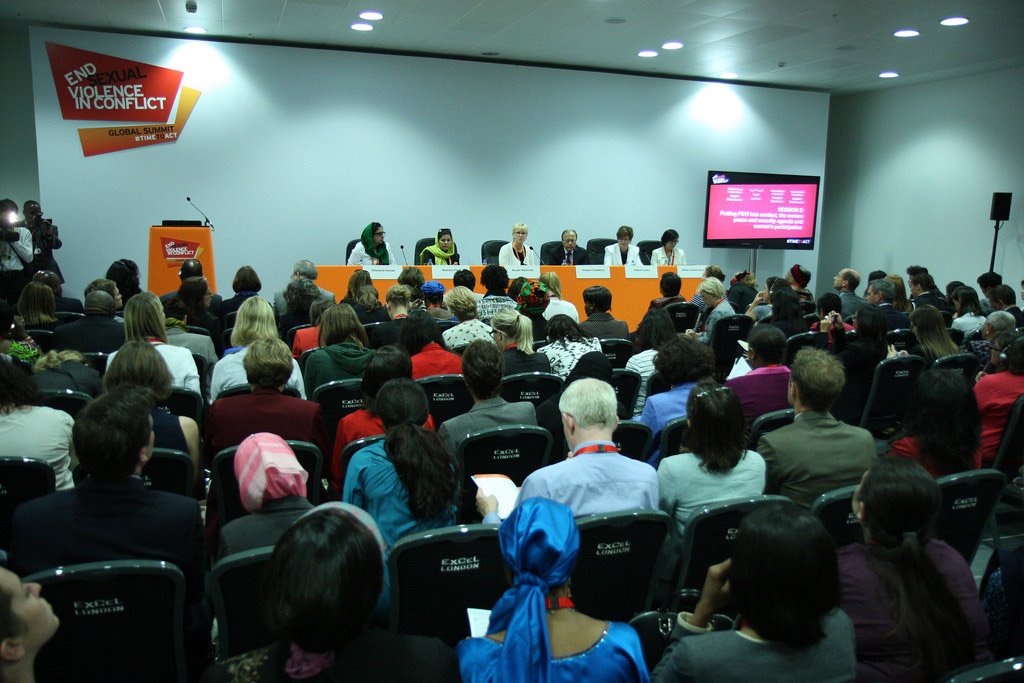April 20, 2024 01:46 (IST)

Ban urges action on sexual violence in conflict
New York, Jun 13 (IBNS): Noting that sexual violence in conflict remains widespread, yet largely invisible, United Nations Secretary-General Ban Ki-moon on Thursday called for concerted efforts to "turn the tide" and rid the world of this scourge.
“We have the tools, political momentum and clarity of purpose to turn the tide on this crime. As we advance together, the United Nations will continue to provide strategic leadership to rid the world of sexual violence in conflict,” Ban said in a message to the Global Summit to End Sexual Violence in Conflict, which is being held in London.
In the message, delivered by Zainab Hawa Bangura, the Secretary-General’s Special Representative on Sexual Violence in Conflict, he said he was encouraged that the gathering brings together officials from different spheres, including the defence and security sector.
“It is essential to expand the ‘circle of action,’” the Secretary-General noted.
The three-day gathering, which began on Tuesday, is co-chaired by United Kingdom Foreign Secretary William Hague and Angelina Jolie, who is the Special Envoy for the UN High Commissioner for Refugees (UNHCR).
It brings together over 900 experts, non-governmental organizations, survivors, faith leaders and international organizations from around the globe to create momentum against sexual violence in conflict and practical action that impacts those on the ground.
“This Summit is an important vehicle to strengthen collective action to end impunity, boost services, improve the global response, ensure women’s participation and empowerment, and enhance the role of the military and other security sector actors – including United Nations peacekeepers – to prevent conflict-related sexual violence,” said Ban.
He noted that not long ago, conflict-related sexual violence was viewed as a “marginal, sad inevitability,” but on Thursday, it is understood to be an urgent problem at the top of the global agenda.
“Sexual violence in conflict is widespread, yet largely invisible. These heinous acts send a loud message of terror to communities, yet they are shrouded in silence,” the Secretary-General said.
“For victims, rape is often a life-long trauma, yet perpetrators rarely face justice. Those who bear the greatest responsibility for commanding or condoning mass rape are often the least likely to be held accountable.”
He stressed the need to support national governments as they exercise their primary legal and moral responsibility to protect their citizens, and highlighted the examples of Somalia and the Democratic Republic of Congo (DRC) – two countries where rape in conflict seemed intractable.
“Both are now demonstrating that change is possible,” said Ban, noting that the DRC is developing new legal structures to end impunity for perpetrators.
“Both the DRC and Somalia have shown commitment at the highest level to end sexual violence, including by signing joint communiqués with the United Nations. I hope other countries confronted with conflict-related sexual violence will follow these examples.”
Addressing the ministerial dialogue on the hidden victims of sexual violence, Under-Secretary-General for Humanitarian Affairs Valerie Amos highlighted two specific groups: men and boys; and children.
“Sexual violence against men and boys during conflict is as old as war itself. It continues in conflicts around the world and was documented in some 25 conflicts in the decade from 2000 to 2010,” she stated.
Amos noted that in the past few years alone, there is evidence of these crimes in DRC, the Central African Republic (CAR), during the 2007-2008 post-election violence in Kenya, in Syria and in Iraq.
“Men and boys are not only raped, they are subjected to a host of atrocities, from castration to being forcibly stripped and remaining naked during detention, from torture of the genital area to being forced to commit sex acts on others, including members of their own families. Men and boys who are forcibly conscripted or detained are particularly vulnerable,” she said.
Turning to boys and girls, Amos noted that sexual violence against children is most common when family and social networks have collapsed and when there is a complete breakdown in law and order – a characteristic of modern warfare, as seen on Thursday in CAR and parts of Syria.
The media, Governments, inter-governmental organizations and civil society are starting to understand the devastating effects of sexual violence in conflict, she noted. But they often focus exclusively on the main group affected: women and girls, seeing men as perpetrators and leaving few resources to help them.
“This has to change,” she stressed. “The effects of sexual violence are devastating, for anyone who is subjected to an attack. No group is more or less deserving of help than any other.”
(Wide view of participants at the Global Summit to End Sexual Violence in Conflict being held in London. Photo: UK Foreign and Commonwealth Office)
Support Our Journalism
We cannot do without you.. your contribution supports unbiased journalism
IBNS is not driven by any ism- not wokeism, not racism, not skewed secularism, not hyper right-wing or left liberal ideals, nor by any hardline religious beliefs or hyper nationalism. We want to serve you good old objective news, as they are. We do not judge or preach. We let people decide for themselves. We only try to present factual and well-sourced news.
Support objective journalism for a small contribution.
Latest Headlines
Iran claims to have shot down several drones launched by Israel in retaliation attack Sat, Apr 20 2024
Canada: Police investigation link a vehicle used in armed carjackings in Greater Toronto Area Fri, Apr 19 2024
Cambodian authorities extradite 130 Chinese nationals over cybercrime, online fraud Fri, Apr 19 2024
Amid political unrest, Pakistan Army reaffirms its dominant role Fri, Apr 19 2024
US vetoes Palestine’s request UN's full membership Fri, Apr 19 2024
The Maldives 'debt distress': President Muizzu faces domestic outrage over China affinity Fri, Apr 19 2024
Israeli missile hits Iran as tension escalates in Middle East Fri, Apr 19 2024







